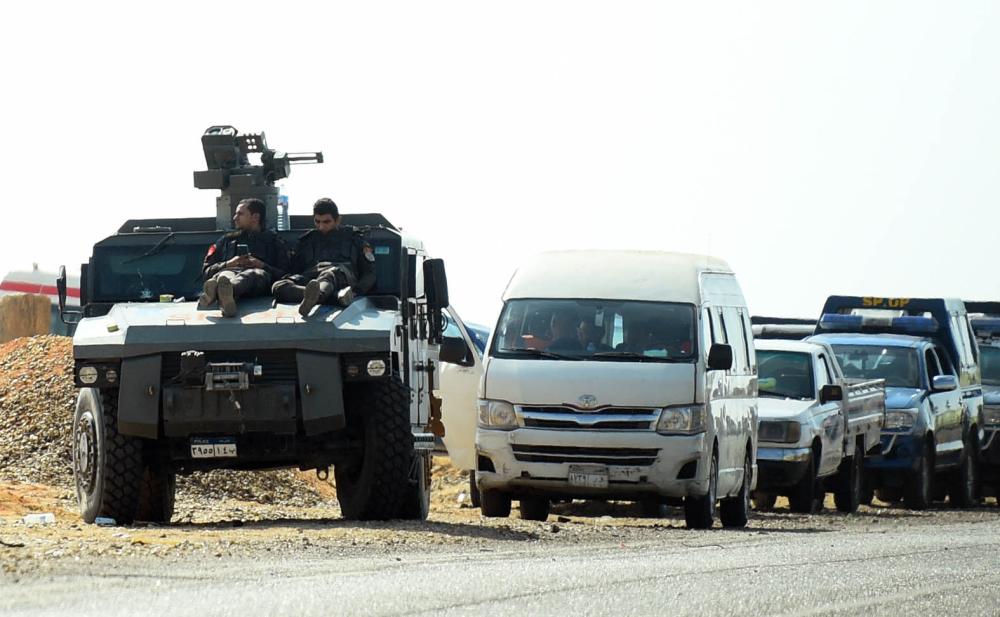
A wave of unprecedented violent attacks against police and army forces have surfaced in Egypt, spurring questions about Egypt’s political scene, the nature of these attacks and terrorist affiliations. These incidences spiked in the wake of the June 30th uprisings, that led to the overthrow of Islamist Muslim Brotherhood President Mohamed Morsi.
Reports that the IS affiliated group of ‘Sinai Province’, attacked another police or army checkpoint in North Sinai have become routine to Egyptians. Attacks that take place in Cairo, near the outskirts or even inside the Delta governorates, have become synonymous with two militant groups suspected to be MB affiliated, ‘Lewaa El Thawra’ and ‘Hasm’.
On Friday, however, a different militant confrontation took place between the police Special Forces and a group of anonymous militants, who managed to kill 16 policemen including high-ranking officers, according to a statement released from the Interior Ministry.
The shootout occurred after the Egyptian National Security apparatus received information on the presence of militant group inside the desert of El-Wahat El Baheria road, located between the governorate of Giza and Fayoum, the information was collected from four detainees from the Qaluibyia governorate.
Since the attack, no militant organization has claimed responsibility for the clashes. The absence of responsibility from any group has raised speculations about the formation of a new militia, with a whole new set of ideologies than IS and Muslim Brotherhood.
The Interior Ministry did not clarify the identity of the militants or their ideology, however numerous local media reports, that quoted security sources, indicated that the perpetrators were not affiliated to IS, ‘Hasm or Lewaa El Thawra’ as expected. The suspected militant group is the ‘Marbtoon’ troop, formed by fired former ‘Sa’aka’ army officer, Hesham Ashmwai, who showed signs of extreme views from the start of his army service in 1994.
The ideologies are similar to that of the infamous ‘Al-Qaeda’, formed by Osama Bin Laden. Ashmwai voiced harsh criticism of his college to his fellow officers over a lack of proficiency in reading verses of Quran. As a result of his strong opinions he was referred to investigations, where the army decided to move him from ground ‘Sa’aka’ forces to its administrative staff in 2000.

The 43 year –old officer was referred to military trial in 2011 on charges of inciting against the army, at that time the court decided to fire him from service. Ashmwai began trade work after his discharge, where he met a number of extremists who convinced him to join their radical ideology.
The new ideology resonated with the former officer and he decided to move to Syria from Turkey in 2013 to fight against the Al-Assad’s political regime. He returned to Egypt to participate in the MB sit-in of Rabaa Al-Adwayia, a counter-protest against the oust of Mohamed Morsi.
The protest was dispersed so Ashmawai traveled to Libya and joined up with four fired Egyptian police officers, set-up in military camps located in the Libyan city of ‘Derna’. The men made up a small militant group called ‘Ansar Byat El-Maqdus’, now known as ‘Sinai Province’.
With the help of Ashmawai, the group managed to carry out number of violent militant attacks that targeted army checkpoints inside North Sinai and Egypt’s western desert, including one in 2014 that left nearly 22 troops dead.
Discord arose between the former officer and the ‘Ansar Byat El-Maqdus’ members in 2014, when the group pledged their allegiance to the Islamic State. Ashmawai transcribed to the ideologies of former ‘Al-Qaeada’ leader Osama Bin Laden, which differ to that of the IS.
In 2015, Ashmawai ended his relationship completely with ‘Ansar Byat El-Maqdus’ and headed back to Libya, where he established a new militant group, ‘Morbatoon’.
With the surname of ‘Abo Omar El Mohager’, Ashmawai released a voice recording in which he called on Egyptians to target army and police forces and kill them, referring to these troops as ‘apostates’.
The ‘Morbatoon’ leader provided training for his group in Libya. Since the emergence of his new Libyan militant group, Ashmawai and his members have become targets of the Egyptian political regime, IS and the ‘Sinai Province’, who put them on an assassination list.
The former ‘Sa’aka’ officer is also wanted by the Egyptian authorities on multiple charges including, involvement in the assassination of Egypt’s former General-prosecutor Hisham Barakat in 2015, participating in a failed assassination trial of Egypt’s former Interior Ministry Mohamed Ibrahim, plans to target the ‘101’ borders’ guard battalion located inside the North Sinai city of Al-Arish in 2015, an attack that left 29 army conscripts dead, as well as a death sentence in absentia with 13 other defendants on charges of perpetrating the ‘Farafra’ militant attack that took place in 2014 against an army checkpoint that left 22 army conscripts dead.




